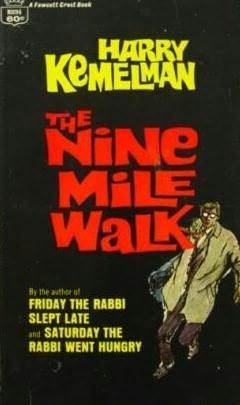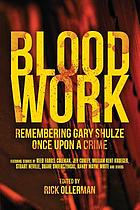Back in January, when I produced my
yearly thing I wrote: "I was somewhat surprised to discover that this is my
tenth annual list of the best short mysteries of the year, as determined
by me. I will have to do something to celebrate that in a month or
two."
Well, more than a month has passed, but here we
are. My first thought was to pick out the Best of the Best from the 151
stories that made my original list, but that seemed like a fool's
errand for various reasons. Below you will find 15 categories,
subgenres if you will, and in each I have listed five stories that made
my best of lists in the last decade. They aren't the Best of the Best, just excellent examples of their subgenre. Of course, some of these could have
easily fit into several categories.
And by the way, there is a hidden category tucked away here: stories with twist endings. There are many examples below but to point them out would be counterproductive.
As a
lagniappe I have added a
Classic story in each category. "Classic" here is defined as a great
story that was published before I started reviewing.
Availability!
In each case I have listed the original publication unless I thought
there was a more available site. I provided links to a few stories that
are available for free on the web. You may find others elsewhere on
the web but I suspected those sites might be copyright-violators or
malicious, so I skipped 'em.
AMATEUR SLEUTH
Palumbo, Dennis. "A Theory of Murder," available free at
Kings River Lite.
Perks, Micah. "Treasure island," in
Santa Cruz Noir, edited by Susie Bright, Akashic Press, 2018.
Petrin, Jas. R. "Money Maker," in
Alfred Hitchcock's Mystery Magazine, May/June 2017.
Rusch, Kristine Kathryn. "The Wedding Ring," in
Ellery Queen's Mystery Magazine, March/April 2018.
Rozan, S.J. "Chin Yong-Yun Meets A Ghost," in
Ellery Queen's Mystery Magazine, March/April 2015.
Classic: Kemelman, Harry. “The Nine Mile Walk” in
The Nine Mile Walk and Other Stories.
COZY
Cajoleas, Jimmy. "The Lord of Madison County," in
Mississippi Noir, edited by Tom Franklin, Akashic Press, 2016.
Harlow, Jennifer. "The Bubble," in
Atlanta Noir, edited by Tayari Jones, Akashic Press, 2017.
Page,
Anita. “Isaac’s Daughters,” in
Malice Domestic Presents: Murder Most
Geographical, edited by Verena Rose, Rita Owen, and Shawn Reilly
Simmons, Wildside Press, 2018.
Stevens, B.K. "The Last Blue Glass," available free at
B.K. Stevens's website.
Todd, Marilyn. "Slay Belles," in E
llery Queen's Mystery Magazine. January/ February 2017.
Classic: Asimov, Isaac. “The Acquisitive Chuckle,” in
Tales of the Black Widowers.
CRIMINAL’S POINT OF VIEW
Block, Lawrence. “Who Knows Where It Goes,” in
Ellery Queen’s Mystery Magazine, January 2010.
Howard, Clark. “White Wolves” in
The Crooked Road, Volume 3.
Paul, Bryan. "The Ice Cream Snatcher," in
Thuglit, issue 13, 2014.
Sareini, Ali. F. "A Message In The Breath Of Allah," in
Prison Noir, edited by Joyce Carol Oates, Akashic Press, 2014.
Warthman, Dan. "Pansy Place," in
Alfred Hitchcock's Mystery Magazine, January-February 2012.
Classic: Francis, Dick. "A Carrot for a Chestnut," in
Field of Thirteen.
ESPIONAGE
Child, Lee. “Section 7 (a) (Operational),” in
Agents of Treachery, edited by Otto Penzler, Vintage Crime, 2010.
Deaver, Jeffery. "Hard to Get," in
Ellery Queen's Mystery Magazine, July/August 2017.
Faherty, Terence. "Margo and the Silver Cane," in
Alfred Hitchcock's Mystery Magazine, January/February 2013.
Lawton, John. “East of Suez, West of Charing Cross Road,” in
Agents of Treachery, edited by Otto Penzler, Vintage Crime, 2010.
Rabb, Jonathan. "A Game Played," in
The Strand Magazine, June-September 2013.
Classic: Household, Geoffrey. “Keep Walking,” in
Days of Your Fathers.
FANTASY
Blakey, James. "Do Not Pass Go," in
Mystery Weekly Magazine, September 2017.
Goree, Raymond. "A Change of Heart," in
Alfred Hitchcock's Mystery Magazine, October 2012.
Law, Janice. "The Crucial Game," in
Alfred Hitchcock's Mystery Magazine, January-February 2018.
Powell, James. “The Black Whatever.”
Ellery Queen’s Mystery Magazine, January 2010.
Rozan, S. J. "e-Golem," in
Ellery Queen’s Mystery Magazine,September-October 2017.
Classic: Ellison, Harlan. “The Whimper of Whipped Dogs,” in
Deathbird Stories.
HISTORICAL
Levinson, Robert S. “Regarding Certain Occurrences In
A Cottage At The Garden Of Allah,” in
Alfred Hitchcock’s Mystery
Magazine, November 2009.
Law, Janice. “Madame Selina,” free
podcast.
Rutter, Eric. “Runaway” in
Alfred Hitchcock's Mystery Magazine, September 2009.
Thornton, Brian.“Paper Son,” in
Seattle Noir, edited by Curt Colbert, Akashic Press.
Williams, Jim. "The Hotel des Mutilées," on Williams's
website.
Classic: Borges, Jorge Luis. “The Garden of Forking Paths,” in
Collected Fictions.
HUMOROUS
Gould, Heywood. "Everything is Bashert," in
Jewish Noir, edited by Kenneth Wishnia, PM Press, 2015.
Lawton, R.T. "Black Friday," in
Alfred Hitchcock's Mystery Magazine, November/December 2017.
Maron, Margaret. "We On The Train!" in
Ellery Queen’s Mystery Magazine, May 2015.
Schofield, Neil. "It'll Cost You," in
Alfred Hitchcock's Mystery Magazine, September 2014.
Wiley, Michael. "Making It," in
Ellery Queen’s Mystery Magazine, September-October 2017.
Classic: Thurber, James. “The Catbird Seat,” in
Thurber on Crime.
NOIR
Crouch, Blake. “The Pain of Others,” in
Alfred Hitchcock's Mystery Magazine, March 2011.
Gaylin, Alison. "Restraint" in
Ellery Queen’s Mystery Magazine, March/April 2013.
Neville,
Stuart. "Faith," in
Blood Work: Remembering Gary Shulze: Once Upon A
Crime, edited by Rick Ollerman, Down and Out Books, 2018.
Pluck, Thomas. "The Uncleared," available free at
A Twist of Noir.
Stodghill, Dick. “Deathtown,” in
Alfred Hitchcock's Mystery Magazine, November. 2009.
Classic: Kinsella, W.P. "Dance Me Outside," in
Dance Me Outside.
PASTICHE
Faherty, Terence. "The Man With The Twisted Lip," in
Ellery Queen’s Mystery Magazine, February 2015.
Lewis, Evan. "The Continental Opposite," in
Alfred Hitchcock's Mystery Magazine, May 2015.
Warren, James Lincoln. "Shikari," in
The 1% Solution.
Warren, James Lincoln. “Shanghaied” in
The 1% Solution.
Zeltserman, Dave. “Julius Katz,” in
The Julius Katz Collection.
Classic: Powell, James. “The Tamerlane Crutch,” in
Christmas Forever.
POLICE
Alcalá, Kathleen. “Blue Sunday” in
Seattle Noir, edited by Curt Colbert, Akashic Press.
Camilleri, Andrea. "Neck and Neck," in
Montalbano's First Case and Other Stories.
Estleman, Loren D. “Death Without Parole.” in
Detroit is Our Beat: Tales of the Four Horsemen.
Phelan, Twist. "Footprints in Water," in
Ellery Queen’s Mystery Magazine, July 2013.
Powell, James. “The Teapot Mountie Ball,” in
Ellery Queen’s Mystery Magazine, March/April 2011.
Classic: Westlake, Donald E. “Come Back, Come Back,” in
Levine.
PRIVATE DETECTIVE
Crowther, Brad. “Politics Makes Dead Bedfellows,” in
Alfred Hitchcock's Mystery Magazine, July/August 2011.
Gates, David Edgerley. "Slip Knot," by David Edgerley Gates,
Alfred Hitchcock's Mystery Magazine, November 2011.
Helms, Richard. "Busting Red Heads," in
Ellery Queen’s Mystery Magazine, March/April 2014.
Moran, Terrie Farley. "Inquiry and Assistance," available for free on
Moran's website.
Rusch, Kristine Kathryn. “The Case of the Vanishing Boy.”
The Case of the Vanishing Boy.
Classic: Grafton, Sue. “A Poison That Leaves No Trace,” in
Kinsey and Me.
PSYCHOLOGICAL
Brackmann, Lisa. "Don't Feed The Bums," in
San Diego Noir, Akashic Press, 2011.
Cody, Liza. "I Am Not Fluffy," in
Ellery Queen’s Mystery Magazine, December 2013.
Itell, Jennifer. “Inevitable.”
Ellery Queen’s Mystery Magazine, November 2010.
Merchant, Judith. “Monopoly.”
Ellery Queen’s Mystery Magazine, March/April 2009.
Pronzini, Bill and Barry N. Malzberg. "Night Walker," in
Alfred Hitchcock's Mystery Magazine,, March-April 2018.
Classic: Bradbury, Ray. "The Fruit at the Bottom of the Bowl," in
The Golden Apples of the Sun.
SUI GENERIS
Armstrong, Jason. "Man Changes Mind," available free at
Thrillers, Killers, 'n Chillers.
Muir, Brian. “Dummy,” in
Ellery Queen’s Mystery Magazine, May 2009.
Rogers, Cheryl. "The Ballad of Maggie Carson," in
Ellery Queen’s Mystery Magazine, May 2016.
Smith, Mark Haskell. “1968 Pelham Blue SG Jr.” in
Crime Plus Music, edited by Jim Fusilli, Three Rooms Press, 2016.
Weikart, Jim, "The Samsa File," in
Alfred Hitchcock's Mystery Magazine, September 2013.
Classic: Faulkner William. “A Rose For Emily,” in
A Rose For Emily and Other Stories.
SUSPENSE
Buck, Craig Faustus. "Blank Shot," in
Black Coffee, edited by Andrew MacRae, Dark House Books, 2016.
Day, Russell. "The Icing on the Cake," in
Noirville, Fahrenheit Press, 2018.
Estleman, Loren D. “Rumble Strip” in
Amos Walker: The Complete Story Collection.
Gates, David Edgerley. "Cabin Fever," in
The Best American Mystery Stories 2018.
Tippee, Robert. "Underground Above Ground," in
Alfred Hitchcock's Mystery Magazine, March/April 2017.
Classic: Cail, Carol. “Sinkhole,” in
Alfred Hitchcock's Mystery Magazine, Presents Fifty Years of Crime and Suspense.
VICTIM’S POINT OF VIEW
DuBois,
Brendan. "The Final Ballot," in
Mystery Writers of America presents
Vengeance, edited by Lee Child, Mulholland Books, 2012.
Hallman, Tom, Jr. "Kindness," in
Mystery Weekly Magazine, April 2018.
Law, Janice, "The Double," in
Sherlock Holmes Mystery Magazine, Issue 7.
Opperman, Meg. "The Discovery," in
Sherlock Holmes Mystery Magazine, Issue 18.
Rusch, Kristine Kathryn. "Christmas Eve at the Exit," in
The Best American Mystery Stories 2016.
Classic: Ellin, Stanley. "You Can't Be a Little Girl all Your Life," in
The Specialty of the House and Other Stories.















































